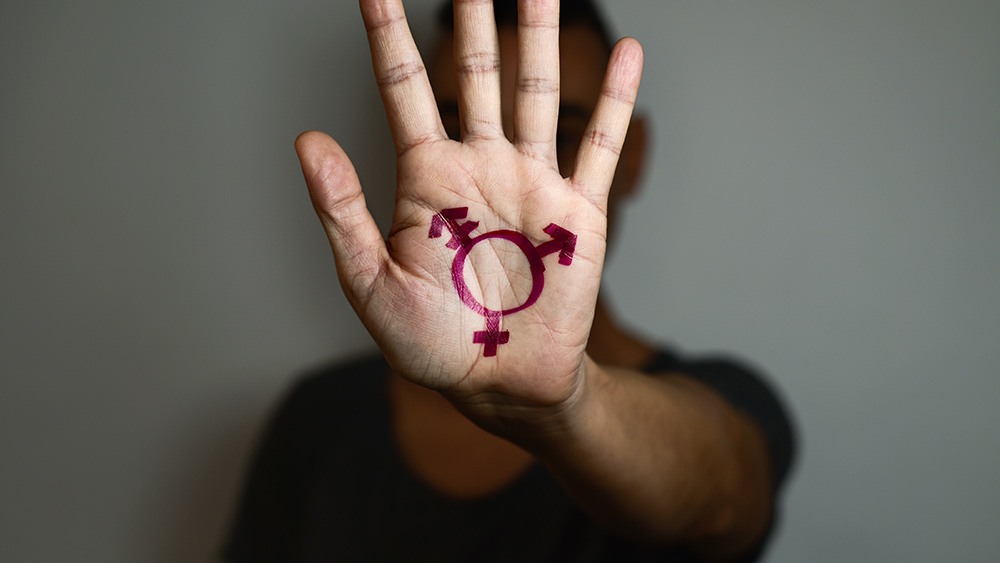When the state comes for your kids
06/25/2021 / By News Editors

Ahmed is a Pakistani immigrant, a faithful Muslim, and until recently, a financial consultant to Seattle’s high-tech sector. But when he reached me by phone in October 2020, he was just one more frightened father. Days earlier, he and his wife had checked their 16-year-old son into Seattle Children’s Hospital for credible threats of suicide. Now, Ahmed was worried that the white coats who had gently admitted his son to their care would refuse to return him.
(Article by Abigail Shrier republished from City-Journal.org)
“They sent an email to us, you know, ‘you should take your ‘daughter’ to the gender clinic,'” he told me.
At first, Ahmed (I have changed names in this essay to protect the identities of minor children) assumed there had been a mistake. He had dropped off a son, Syed, to the hospital, in a terrible state of distress. Now, the email he received from the mental health experts used a new name for that son and claimed he was Ahmed’s daughter. “They were trying to create a customer for their gender clinic . . . and they seemed to absolutely want to push us in that direction,” he said when I spoke to him again this May, recalling the horror of last October. “We had calls with counselors and therapists in the establishment, telling us how important it is for him to change his gender, because that’s the only way he’s going to be better out of this suicidal depressive state.”
Syed had been a “straight-A student” and—according to his parents and the family’s therapist—quite brilliant. He is also on the autism spectrum, a young man who neglects to make eye contact and must be given rules for how long to shake hands, shower, or brush his teeth. High school was a slog for him, as it often is for kids on the spectrum who find that the social demands of adolescence have risen beyond their capacity to meet them. “He tried to ask a few girls out. It didn’t work out and he got frustrated and angry, and that kind of thing. And so, those girl-boy things get kind of tough for autistic kids, those developmental issues. And that’s where puberty can be very, very hard with the hormones rushing and all this stuff.”
When lockdowns hit, the boy who was already struggling socially and befuddled by questions neurotypical teens take for granted (How do I show a girl I like her? How do I make the other kids include me?) began to spend all day and night on the Internet. “He’s an autistic kid, and so he kind of lost track of time. And he was staying up a lot. So he was staying up, just being on the Internet, Twitter, Tumblr, whatever. . . . And he was in his room, just, you know, sleeping one or two hours a day. And that can really be devastating. He was very confused. He was seeing things, visual hallucinations. And we didn’t know why.”
It is not definitively known why many neurodiverse adolescents identify as transgender, but more than one scientist has pointed out the high rates of coincidence. As several autism experts have explained to me, those on the spectrum tend to fixate, and when a contagious idea is introduced to them—such as the notion that they might be a “girl in a boy’s body”—they are particularly susceptible to it.
As child psychiatrist and expert in gender dysphoria Susan Bradley said to me: “The messages these kids pick up [from trans influencers] when they’re online is, ‘We’re the only people who understand you. Your people, your parents, don’t really understand you.’ And it may be the first time in their lives that anybody has said to them, ‘We understand you. We know you. You’re okay. You’re just like us.’ And it’s powerful.”
I asked Bradley if introducing gender ideology to kids who tend to fixate is like introducing cocaine to those susceptible to addiction. She agreed: “It has the same power to assuage all the alienation and grief and distress that these kids have been struggling with.”
Because of a Covid-19 policy, Ahmed could not stay at the hospital with his son back in October. Syed, in a sleep-deprived and confused state, furious at the parents who had admitted him, and in consultation with hospital staff and a social worker, decided that his problem was gender.
The age at which minors in the State of Washington can receive mental health and gender-affirming care without parental permission is 13. In other words, the emails Ahmed received from the hospital were effectively a courtesy; the hospital did not require Ahmed’s permission to begin his son on a path to medical transition.
But unlike some other parents I would later speak with, Ahmed’s cool head prevailed. Believing he might be walking into a trap, Ahmed reached out to both a lawyer and a psychiatrist friend he trusted. The psychiatrist gave him advice that he believes saved his son, saying, in Ahmed’s words: “You have to be very, very careful, because if you come across as just even a little bit anti-trans or anything, they’re going to call the Child Protective Services on you and take custody of your kid.” The lawyer told Ahmed the same: “What you want to do is agree with them and take your kid home. When the gender counselors advise you to ‘affirm,’ go along with it. Just say ‘Uh-huh, uh-huh, okay, let’s take him home, and we’ll go to the gender clinic.'”
Ahmed assured Seattle Children’s Hospital that he would take his son to a gender clinic and commence his son’s transition. Instead, he collected his son, quit his job, and moved his family of four out of Washington.
Was Ahmed’s reaction extreme? When I first heard it, back in October 2020, I wondered whether he hadn’t overreacted. But as a growing number of parents began contacting me with similar stories, and I delved into the state laws of Washington, Oregon, and California, I came to a different conclusion. Taken individually, no single law in any state completely strips parents’ rights over the care and mental health treatment of their troubled minor teens. But pieced together, laws in California, Oregon, and Washington place troubled minor teens as young as 13 in the driver’s seat when it comes to their own mental health care—including “gender affirming” care—and renders parents powerless to stop them.
Here, for instance, are the powers granted to a 13-year-old child by the state of Washington. Minors age 13 and up are entitled to admit themselves for inpatient and outpatient mental health treatment without parental consent. Health insurers are forbidden from disclosing to the insured parents’ sensitive medical information of minor children—such as that regarding “gender dysphoria [and] gender affirming care.” Minors aged 13 to 18 can withhold mental health records from parents for “sensitive” conditions, which include both “gender dysphoria” and “gender-affirming care.” Insurers in Washington must cover a wide array of “gender-affirming treatments” from tracheal shaves to double mastectomies.
Put these together, and a seventh grader could be entitled to embark on “gender affirming care”—which may include anything from a provider using the child’s name and pronouns to the kid preparing to receive a course of hormones—without her parents’ permission, against her parents’ wishes, covered by her parents’ insurance, and with the parents kept in the dark by insurance companies and medical providers.
Lest you wonder whether there is some madcap elixir polluting the groundwater of Washington State alone, in 2015, Oregon passed a law permitting minors 15 and older to obtain puberty blockers, cross-sex hormones, and surgeries at taxpayers’ expense—all without parental consent. In 2018, California passed a similar bill for all children in foster care, age 12 and up. The California state senate is now considering an amendment to the Confidentiality of Medical Information Act that would bar health insurers from disclosing medical information to parents about their dependents, on pain of criminal liability.
One Washington mother I spoke with, Nicole, has a 16-year-old daughter who struggled with an eating disorder and other mental health problems after being molested by a peer in elementary school. Just before her 13th birthday, the daughter decided she was transgender. “She hated her body, that was truly a real thing,” Nicole told me. “So we wanted to find her help.” But Nicole wasn’t convinced that her daughter had gender dysphoria, since she’d never before shown any signs of discomfort with her biological sex. “She had already been through a whole counseling program with the eating disorder and none of this came up.”
Over the next few years, Nicole’s daughter’s mental health worsened, and she began self-harming. After her daughter attempted suicide in 2019, Nicole took her to the emergency room at Highline Hospital (now St. Anne Hospital) in Burien, Washington. Nicole explained to the social worker at the hospital that, though the daughter was insisting her problem was gender, she’d been beset by a variety of mental health struggles for many years. Nicole said that she and her husband were not convinced by the gender dysphoria self-diagnosis and did not “affirm” their daughter’s trans identity. “The social worker was very nice to us,” Nicole told me. “She didn’t show any indication that she was not believing what we were saying or anything like that.”
But a nurse attending Nicole’s daughter who had been through the same thing with his own daughter took pity on Nicole and her husband. When the social worker left the room, Nicole says, he warned them that she was on the way to “emancipate” their child. Washington law does not allow a minor to petition for emancipation until age 16. But according to several parents I spoke with, under the guise of “advising transgender youth of their rights,” social workers will sometimes sprinkle that tidbit onto a 14-year-old, so she knows liberation is only two years away.
Nicole and her husband didn’t wait. They immediately took her home. That was probably a good thing. Her daughter had full rights to go to a shelter where, had she elected to, she could be “affirmed” and started on a path toward medical transition. And, as it turns out, once a troubled teen over the age of 13 elects to stay in a shelter in Washington, it can be fiendishly difficult to extract them. Instead, more than a year later, Nicole reports that her daughter is much better, as is their relationship. The daughter has dropped the idea that she is transgender and is tapering off of anti-depressants.
Read more at: City-Journal.org and GenderConfused.com.
Tagged Under: big government, children's health, deception, gender, gender affirming, gender confused, Gender Dysphoria, identity politics, indoctrination, insanity, mental health, political correctness, society
RECENT NEWS & ARTICLES
COPYRIGHT © 2017 GENDER NEWS





















